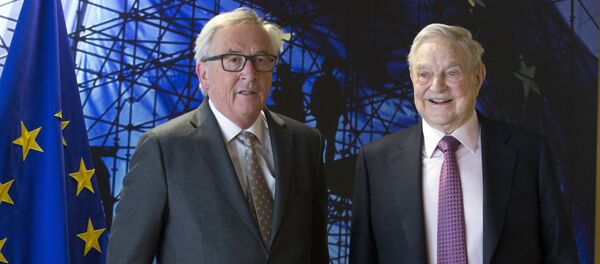Sputnik: What’s your impression of the campaign launched by the Hungarian authorities? How accurate are the accusations made by the EU?
Francesca Totolo: In my opinion, the information campaign launched by the Hungarian government is right because citizens have the right to know what is happening in European institutions.
The timely response from Brussels that accused Hungary of divulging fake news and disinformation is a clear sign of fear about what might come to light.
As I usually do, I rely on the facts and the material that I have available: as stated in the report by the European Court of Auditors from 2018, the European Union, in a non-transparent way, funds a long list of humanitarian NGOs that operate in the countries of origin of migrants who have arrived in Europe in recent years. Some of these also involved in a territorial invasion in Syria and helping the Ukrainian government post-golpe.
Sticking to the data traced in the organisations' annual reports, the European Union also finances BRAC (Bangladesh Rural Advancement Commitee), the largest international NGO based in Bangladesh. (http://www.brac.net/sites/default/files/annual-report/2017/BRAC-AR-2017e.pdf)
BRAC grants migration loans, "loans granted to workers looking for work abroad, integrated with the BRAC migration programme services, such as pre-immigration and post-immigration reintegration".
The biggest beneficiaries have been the citizens of Pakistan and Bangladesh, coincidentally the nationalities with the most numerous asylum seekers in Italy.
Sputnik: Why, in your view, did Brussels react so strongly in response? Isn’t it Hungary’s right to define its own migration policy and protect the interests of its people?
Francesca Totolo: The European Commission, following the NGO law approved by the Hungarian government, the so-called "Stop Soros", has started a campaign against the immigration policies of Premier Viktor Orban, a campaign that will presumably lead to heavy sanctions against Hungary.
The strong and timely reaction by Brussels is also due to the upcoming European elections in May, where it is assumed that the balance of forces in Europe will change drastically with the rise of populist and sovereign parties.
The first duty of a national government is precisely the defence of its borders and defining its migration policy, from which a country's internal security is derived.
What emerged from investigations by Interpol and national intelligence services is that in recent years several terrorists have arrived in Europe through migrant routes, often without identification documents.
To this we must also add the problem of importing organised crime. In Italy, with the arrival of 650,000 illegal migrants, the Nigerian mafia is spreading, with the related drug trafficking, exploitation of prostitution, and organ trafficking.
Sputnik: What does this tell us about the rift in the centre-right European People’s party?
Francesca Totolo: The European People's party is undergoing a strong internal rift. It will hardly remain cohesive after the May elections.
The EPP has clearly highlighted that it does not have a common vision on fundamental policies, such as those on immigration.
How can Viktor Orbán and Jean-Claude Juncker agree, both belonging to the European People's Party?
READ MORE: Hungarian 'Conspiracy Theory' Over Soros, Juncker 'Beggars Belief' — EU
The Hungarian PM is clearly sovereign and occupied with the welfare of his country's citizens, while the President of the European Commission is completely oriented towards an "open society".
The EPP president himself, Frenchman Joseph Daul, immediately criticised the campaign launched by the Hungarian government on social networks. These comments were immediately shared by all the main representatives of the EPP, including Manfred Weber, the leader of the party in the European Parliament and a possible candidate of the party to the presidency of the next European Commission.
One thing is certain: after the May elections, the European Union will be profoundly different from today's.
Sputnik: Do you think the campaign will be able to play a significant role in the outcome of European elections?
Immigration will indeed be the main challenge for the globalist and pro-European parties and the sovereign parties.
There is no EU member state that has not reported the consequences of mass migration in recent years, such as a noticeable increase in crime and degradation in cities.
Clearly, the European Commission's migration policy has been ruinous and has been co-responsible for these dangerous consequences, undermining the credibility of the European Union and erasing the dream, for many the nightmare, of the United States of Europe.
The views and opinions expressed by the contributor do not necessarily reflect those of Sputnik.



